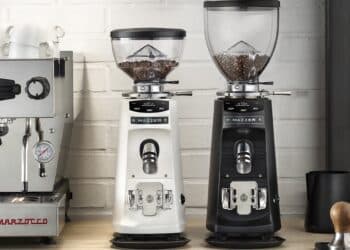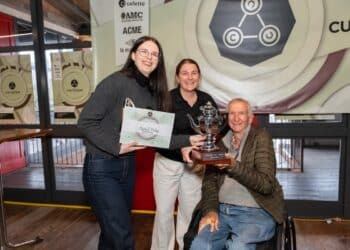To commemorate Fairtrade Fortnight – 2 to 15 August – Fairtrade arranged for Papua New Guinea coffee farmer Mitchell Ricky to travel to Australia and New Zealand to discuss how the organisation has aided producers in the Highlands Organic Agricultural Cooperative (HOAC).
A third-generation coffee farmer, Mitchell tells BeanScene coffee farming has become like tradition in Papua New Guinea.
“My grandfather was a farmer, my father was a farmer, and eventually, my kids will be too,” Mitchell says.
The coffee season in Papua New Guinea lasts from May to August, with a peak in June.
“We have two seasons: wet and dry. Coffee blooms in the wet season, because the rain helps the coffee to flower, produce fruit, and ripen,” Mitchell says.
“Most of our income comes from coffee, with the rest coming from food produce. Outside of coffee season, our daily life is based on gardening and getting our daily food for survival.”

Mitchell’s father pioneered HOAC and helped it to gain Fairtrade certification.
“Through a cooperative, farmers can get benefits our own government or leaders cannot provide. When they come together, they have the power to bargain for a better price,” Mitchell says.
HOAC consists of more than 2600 farmers. Within the cooperative, there are multiple tribes each with their own language and culture. Mitchell says it was his father’s intention to unite these groups and help maintain social cohesion when he formed HOAC.
“The challenges many cooperatives face is linking the different cultures. There are more than 850 languages spoken in Papua New Guinea, so cooperatives cannot send their officers from one village to another to do the same work,” Mitchell says.
“To mitigate that, HOAC has leaders in its different tribal groups, so they can deal with their own affairs.”
While cooperatives can struggle with balancing different cultures, Mitchell says the greatest hurdle to individual farmers is a lack of stable infrastructure.
“The major challenge we face is bad road infrastructure. We live in one of the most remote parts of Papua New Guinea, so bringing the coffee into town is a difficult process,” he says.
“There’s also problems with pricing. We have to get a fair price for the effort we put in. It has been a problem since coffee was introduced to Papua New Guinea, but with Fairtrade now, HOAC now receives a fair price.”
While Mitchell calls the Fairtrade Minimum price of US$1.40 per pound the “icing on the cake”, the Fairtrade Premium means that extra money can be spent on projects that benefit the community HOAC farms in.
“For HOAC, Fairtrade has delivered water projects, pulping machines, schools for our children, and hospitals for our famers when they’re sick. These projects are decided on by HOAC’s members democratically,” Mitchell says.

“These projects have also helped improve the quality of our coffee, especially the pulping machines. Previously, we were using round stones to de-pulp the coffee cherries. The water projects also mean we can wash our cherries after fermentation with clean water, so it’s not contaminated with dirty waters.”
To further help HOAC and Papua New Guinea farmers improve the quality of their coffee, Fairtrade arranged for Coffee Quality Institute (CQI) trainerHernando Tapasco to provide training to certified cooperatives in June 2019.
“He taught us about the science of coffee, from picking to parchment drying and selling. We understand how to do those, but now we know what actually happens and how our actions through that process affect the quality,” Mitchell says.
In particular, he says attendees learnt to only pick ripe cherries, pulp them the day they’re picked, and not over-ferment them before washing and drying.
“If we picked a small quantity, we’d leave it to pulp with the next day’s batch. In a coffee cherry, there’s the mucilage which contains a lot of sugar. If we leave it, that mucilage will dissolve. We have to pulp it same day to keep that mucilage which will help it ferment,” Mitchell says.
“Then for fermenting, we learnt to only do it for eight to 24 hours. We used to leave it for more than a day sometimes if we were distracted by other activities.”
Mitchell says visiting Australia has taught him the value consuming countries apply to their coffee.
“We plant, pick, and produce coffee, but we don’t taste it. Being here and seeing the way people treat coffee, always having a cup in the morning, and enjoying it is a good thing to see, because we put in a lot of effort,” Mitchell says.
“But they have to know when they drink a cup of coffee, it’s through hard labour the coffee is on their table.”
While coffee farming can be difficult, Mitchell says Fairtrade, through the premium, minimum price, and access to training it offers, makes it a lot easier.
“We wouldn’t have access to any of this without Fairtrade,” he says. “It is a great privilege to be a Fairtrade-certified producer.”
Related stories:
• Fairtrade: More than a label
For more information, visit www.fairtrade.com.au
Images: Fairtrade ANZ/Josh Griggs




